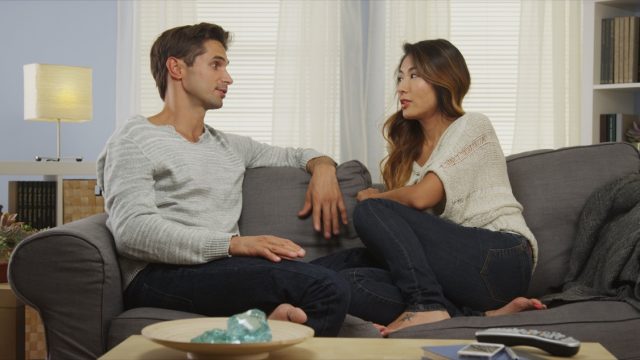This Is the Worst Way You’re Thanking Your Partner, Study Says

Although most people are thankful for their significant others, they hardly say it enough. Many experts agree that expressing gratitude for your significant other is key to maintaining a healthy relationship, but only if you do so correctly. According to a new study, it’s better to thank your partner for being helpful rather than focusing on a sacrifice they made for you. To learn why, read on. And for more kind acts that could be taken the wrong way, find out The Worst Thing You Can Say When Giving a Gift.
The October study, published by the Journal of Social and Personal Relationships, found that it’s not only important to say thank you, it matters how you frame it. The researchers behind the study set out to find out which form of expressing gratitude would have the biggest positive effect on a relationship. What they found was that conveying that the kind action your partner did met your needs (referred to technically as responsive-highlighting) produced positive feelings about the expression of gratitude and the relationship. On the other hand, acknowledging how costly the action was for your significant other (referred to as cost-highlighting) produced no positive feelings about the sentiment of gratitude or the relationship.
For example, “I wouldn’t have been able to get through all of that work without your help” is preferable to, “I know that was annoying for you to help me out today when you had other things to do.”

“These findings suggest that expressing gratitude in a way that highlights how responsive benefactors were may be critical to reaping the relational benefits of gratitude and have practical implications for improving couples’ well-being,” the researchers explained.
Marriage and family therapist and author Sharon Gilchrest O’Neill points out that highlighting your partner’s kind gesture, without honing in on a sacrifice, demonstrates a well-balanced relationship. “Successful and emotionally healthy marriages need to stay balanced in the ongoing give and take that is necessary between partners,” says Gilchrest O’Neill. If you instead “turn helpfulness into a pattern of sacrifice … [you’re] causing indebtedness to constantly be building,” she explains.
RELATED: For more up-to-date information, sign up for our daily newsletter.
Gilchrest O’Neill points out that there may be times when one partner needs more than they can give—and occasional short-term sacrifice is OK, so long as it doesn’t become a pattern. “There are times when a partner is unable to give back for a longer period of time—illness, back in school along with an intense job, etc.,” she explains. “At times like this, the balance will need to be regained over a longer period of time. These situations may feel more like a sacrifice.”
However, generally speaking, Gilchrest O’Neill says that couples “should be able to count on the simple, helpful responsiveness of their partner, knowing that the same will be returned to them.”
Expressing your gratitude for your partner’s ability to understand and meet your needs lends itself to a life of mutual caring and giving, as opposed to pointing out their sacrifice, which could reap resentment. And for more signs of trouble to look out for, know that Your Relationship Is Doomed If Your Partner Does This, Experts Say.